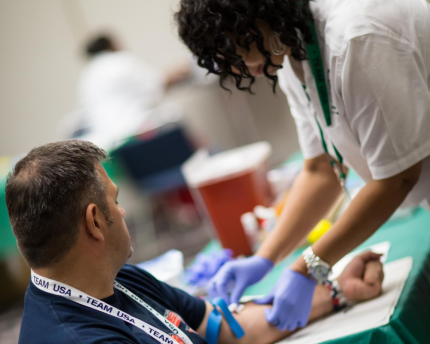U.S. athletes at Olympics not exposed to Zika

Blood samples were drawn from athletes and staff.
Image: Charlie Ehlert, University of Utah Health
That’s what happened to some athletes traveling to Brazil for the Summer Games in 2016. But a study led by University of Utah Health reports that despite fears, none of the U.S. Olympic athletes, Paralympic athletes or staff tested positive for Zika.
The World Health Organization in February 2016 declared that Zika presented an international health threat. The virus, transmitted by Aedes mosquitoes, is usually not a problem. Most people have a mild fever and skin rash. But more serious complications had been reported. In Brazil, there was an increase in babies born with microcephaly -- a rare condition in which an infant’s head is smaller than normal.
None of the American athletes became seriously ill. But some were exposed to other tropical, mosquito-borne viral infections, including West Nile virus, dengue fever and chikungunya, a university news release explains.
While other studies have reported that there were no Zika cases, this study examined a broader array of mosquito-borne illnesses. Researchers focused on 457 athletes and staff who provided blood samples after returning from Brazil. They found that 32 of those tested -- 7 percent -- had become infected with mosquito-borne viruses while abroad. Of that number, 27 had West Nile virus, three had chikungunya and two had dengue.
The incubation period for West Nile is usually two to six days, according to the U.S. Centers for Disease Control and Prevention, but ranges from two to 14 days. For chikungunya (pronounced chik-en-gun-ye), symptoms usually begin three to seven days after being bitten by an infected mosquito. And with dengue, symptoms can take up to two weeks to develop, the CDC reports.
The results will be reported at IDWeek, a national infectious disease conference in San Diego.
Related:
In Brief: Researchers focus on Zika
Virus poses international health threat
Follow StudyHall.Rocks on Twitter.
If you would like to comment, give us a shout, or like us on Facebook and tell us what you think.

